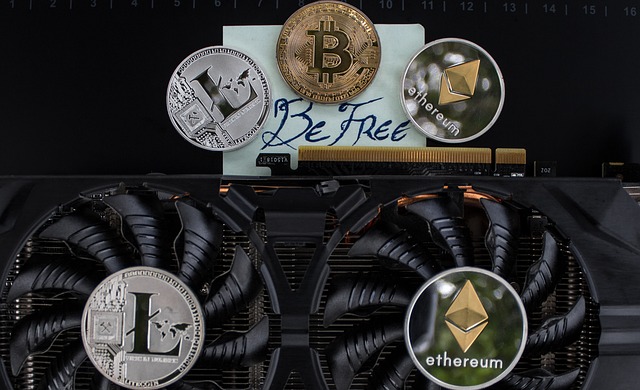Crypto Pioneers: Leading the Way in DeFi
Crypto Pioneers: Leading the Way in DeFi

Decentralized Finance: Revolutionizing the Crypto World
Decentralized Finance, often referred to as DeFi, is making waves in the crypto world. Unlike traditional finance, which relies on centralized authorities such as banks, DeFi is built on blockchain technology and operates in a decentralized manner. This means that participants can engage in financial activities without the need for intermediaries or third parties. The implications of this are far-reaching, as DeFi has the potential to democratize finance and empower individuals across the globe.
One of the key aspects of DeFi is its ability to provide financial services to the unbanked and underbanked populations. In many parts of the world, individuals lack access to basic financial services such as bank accounts and loans. With DeFi, anyone with an internet connection can participate in various financial activities, such as lending, borrowing, and trading, without having to rely on traditional financial institutions. This opens up a world of opportunities for individuals who have been excluded from the formal financial system. By leveraging decentralized technologies, DeFi is revolutionizing the crypto world and paving the way for a more inclusive and accessible financial landscape.
The Birth of DeFi: How It All Started
In the fast-paced world of cryptocurrencies, the birth of decentralized finance, or DeFi, has been nothing short of revolutionary. It all started with the development of blockchain technology, which opened the doors to a new financial ecosystem. Unlike traditional centralized systems, DeFi operates on the principles of decentralization, transparency, and open access.

The roots of DeFi can be traced back to the launch of Bitcoin in 2009, which introduced the concept of a decentralized digital currency. However, it wasn’t until Ethereum’s release in 2015 that the possibilities of decentralized applications truly began to unfold. With the advent of Ethereum’s smart contracts, developers were able to create programmable money and build decentralized financial applications on top of the blockchain. This marked the beginning of a new era in finance, one that promised to democratize access to financial services and eliminate the need for intermediaries.
The Rise of Crypto Pioneers in DeFi
As the decentralized finance (DeFi) sector continues to gain traction, a new wave of crypto pioneers has emerged, pushing the boundaries of innovation and reshaping the landscape of traditional finance. These pioneers are individuals, visionaries, and teams who have dedicated their expertise to exploring the potential of blockchain technology and leveraging it to create new financial possibilities.
Fuelled by a shared belief in the power of decentralization, these crypto pioneers have paved the way for the rise of DeFi. They have developed platforms and protocols that enable users to engage in various financial activities without the need for intermediaries or centralized authorities. With their innovative solutions, they have brought greater accessibility, transparency, and efficiency to the financial ecosystem, challenging the status quo and revolutionizing how we perceive and engage with money.
Exploring the Innovations and Advancements in DeFi
DeFi, short for Decentralized Finance, has seen a rapid growth in recent years, bringing forth a myriad of innovations and advancements. One of the key innovations in DeFi is the concept of decentralized exchanges (DEX), which have gained significant popularity among cryptocurrency enthusiasts. Unlike traditional exchanges, DEXs operate without intermediaries or a centralized authority.

Another notable innovation in DeFi is the introduction of yield farming and liquidity mining. These concepts enable individuals to earn passive income by providing liquidity to various decentralized platforms. By locking their funds in smart contracts, liquidity providers contribute to the overall liquidity of the platform and are rewarded with additional tokens or fees for their participation. This incentivizes individuals to actively contribute to the growth and sustainability of the DeFi ecosystem. Furthermore, the introduction of decentralized lending and borrowing platforms has revolutionized the way individuals can access and utilize their cryptocurrencies. These platforms eliminate the need for cumbersome loan applications and approval processes, allowing users to borrow or lend funds directly through smart contracts. This enables users to utilize their digital assets as collateral, obtaining loans without the need for a traditional credit check process.
As DeFi continues to evolve, numerous advancements are being made to enhance the user experience and address scalability issues. Layer 2 solutions, such as side chains and state channels, are being developed to alleviate the network congestion and high transaction fees experienced in some DeFi applications. These layer 2 solutions enable faster and cheaper transactions, making DeFi more accessible to a broader audience. Additionally, the integration of oracles, which serve as bridges between blockchain networks and real-world data, has allowed DeFi platforms to expand beyond the limitations of the blockchain and access real-time information. This has opened up opportunities for more complex financial instruments, such as decentralized derivatives and prediction markets, to thrive within the DeFi space.
With such innovations and advancements taking place in the realm of DeFi, the future of this nascent sector appears promising. However, as the DeFi space continues to grow, it also faces several challenges including regulatory scrutiny, security concerns, and scalability issues. Overcoming these obstacles will be crucial for DeFi to achieve mainstream adoption and truly revolutionize the traditional financial system. Nonetheless, the possibilities are endless, and as more individuals and institutions recognize the potential of DeFi, we can expect to witness even greater innovations and advancements in the coming years.
Unleashing the Potential: How DeFi is Disrupting Traditional Finance
DeFi, short for decentralized finance, is causing a major upheaval in the world of traditional finance. With its unique features and innovative technologies, DeFi is unleashing the potential to disrupt the established financial systems.
One of the ways in which DeFi is revolutionizing traditional finance is by eliminating the need for intermediaries. In the traditional financial system, banks and other financial institutions act as middlemen, charging fees and controlling the flow of money. However, with DeFi, individuals can transact directly with each other through smart contracts, cutting out the middlemen and reducing costs. This decentralized approach not only saves money but also increases transparency and security in financial transactions. Furthermore, DeFi enables anyone with an internet connection to access financial services, regardless of their location or background, leveling the playing field and making finance more inclusive.
In addition to removing intermediaries, DeFi offers a range of innovative financial products and services. From decentralized lending and borrowing platforms to decentralized exchanges, individuals have greater control over their funds and can participate in a global, permissionless financial system. This new wave of technological advancements in DeFi is creating opportunities for entrepreneurs to build and innovate in ways that were previously unimaginable. As more people recognize the potential of DeFi and the benefits it offers, the traditional financial landscape may look very different in the years to come.
The Role of Crypto Pioneers in Shaping DeFi
Crypto pioneers have played a significant role in shaping the landscape of decentralized finance (DeFi).

One of the key contributions of crypto pioneers in shaping DeFi has been the development of smart contracts. These self-executing digital contracts have completely transformed the way transactions are carried out in the decentralized ecosystem. By eliminating the need for intermediaries and automating the execution of agreements, smart contracts have not only increased efficiency but have also enhanced security and transparency. Through their tireless efforts and visionary mindset, crypto pioneers have laid the foundation for DeFi’s evolution and have set the stage for a decentralized financial system that challenges traditional finance.
Challenges Faced by Crypto Pioneers in the DeFi Space
Facing numerous challenges, crypto pioneers in the DeFi space have had to navigate through uncharted territory. One major obstacle they encounter is the issue of security. With billions of dollars at stake, ensuring the protection of users’ funds is of utmost importance. However, the decentralized nature of DeFi platforms makes them vulnerable to hacking and fraud. Without the safety net of centralized authorities, crypto pioneers have had to implement innovative security measures to safeguard users’ assets, such as multi-signature wallets and audits of smart contracts. Despite these efforts, the constant cat-and-mouse game with hackers puts the resilience of these security measures to the test.
In addition to security concerns, another challenge faced by crypto pioneers in the DeFi space is regulatory uncertainty. As DeFi operates outside the traditional financial system, it has caught the attention of regulatory bodies worldwide. The lack of clear guidelines and regulations governing DeFi has created a gray area that crypto pioneers must navigate carefully. Attempting to strike a balance between remaining compliant with existing regulations and fostering innovation is no easy task. Some countries have embraced DeFi and are actively working on creating regulatory frameworks, while others have taken a more cautious approach. As the regulatory landscape evolves, crypto pioneers must stay flexible and adapt to new rules and requirements that may be imposed, all while continuing to drive the DeFi revolution forward.
The Success Stories: Notable Crypto Pioneers in DeFi
One of the notable success stories in the world of DeFi is the story of Andre Cronje, the creator of the popular decentralized finance project, Yearn.finance. Cronje’s journey in the DeFi space began with the launch of Yearn.finance in February 2020. The project quickly gained attention and popularity within the crypto community, becoming one of the driving forces behind the DeFi boom of 2020.
What set Cronje apart was his constant drive for innovation and his willingness to experiment with new ideas. Despite facing some setbacks and criticism along the way, he remained committed to the development of Yearn.finance and continued to iterate on the project, introducing new features and improvements. His dedication and perseverance paid off, as Yearn.finance emerged as one of the most successful and influential DeFi projects to date, showcasing the immense potential of decentralized finance.
Another notable crypto pioneer in the DeFi space is Hayden Adams, the creator of Uniswap. Uniswap is a decentralized exchange protocol that allows for the seamless swapping of ERC-20 tokens without the need for intermediaries. Adams’s story is one of true inspiration, as he built Uniswap as a side project while working a day job as a mechanical engineer.
What made Uniswap stand out was its simplicity and user-friendly design, which attracted a huge user base. The protocol quickly gained traction within the DeFi ecosystem, becoming one of the go-to platforms for token swapping. Adams’s success with Uniswap not only showcased his technical abilities but also highlighted the power of decentralized finance in providing accessible and efficient financial services.
Overall, these success stories of notable crypto pioneers in DeFi demonstrate the transformative potential of decentralized finance and the immense opportunities it offers for individuals to create innovative solutions that reshape the financial landscape.
Lessons Learned from Crypto Pioneers in DeFi
The journey of crypto pioneers in the decentralized finance (DeFi) space has been filled with valuable lessons that can guide aspiring innovators in this ever-evolving landscape. One prominent lesson that emerged from their experiences is the importance of thorough research and due diligence. Crypto pioneers have emphasized the need to thoroughly understand the underlying technology, protocols, and risks associated with DeFi projects. They have learned that diving into the DeFi space without proper research can lead to significant financial losses and missed opportunities.
Another valuable lesson is the need for diversification. Crypto pioneers have realized that relying too heavily on a single DeFi project can be risky. They have learned to spread their investments across different platforms, protocols, and tokens to mitigate potential losses. By diversifying their portfolio, they not only increase their chances of success but also safeguard themselves against the volatility and uncertainties inherent in the crypto market. This lesson holds true not only for crypto pioneers but for any individual venturing into the DeFi space.
The Future of DeFi: What Lies Ahead?
As decentralized finance (DeFi) continues to gain momentum, the future of this disruptive technology looks promising. With its potential to revolutionize the traditional financial system, DeFi is expected to play a significant role in shaping the future of finance.
One of the key factors contributing to the future success of DeFi is its ability to provide financial services to the unbanked and underbanked populations around the world. By leveraging blockchain technology, DeFi opens up access to financial services, such as lending, borrowing, and saving, to individuals who do not have access to traditional banking systems. This has the potential to empower millions of people, particularly in developing countries, by providing them with financial inclusion and economic opportunities. With the rise of mobile technology and internet connectivity, more individuals are gaining access to DeFi platforms, which further fuels the growth and adoption of this technology.
Furthermore, the future of DeFi holds immense potential for innovation and advancements. As more developers and entrepreneurs enter the space, we can expect to see new and exciting projects being developed. These projects will not only enhance the functionality and usability of existing DeFi platforms but also introduce novel solutions and products that cater to various financial needs. With the increasing popularity of decentralized applications (dApps), we can also anticipate the integration of DeFi into other sectors beyond banking, such as insurance, real estate, and supply chain management. The possibilities are endless, and the future of DeFi is set to be an exciting and transformative journey.
• DeFi has the potential to provide financial services to the unbanked and underbanked populations around the world
• By leveraging blockchain technology, DeFi opens up access to lending, borrowing, and saving for individuals without traditional banking systems
• This can empower millions of people in developing countries by providing them with financial inclusion and economic opportunities
• The rise of mobile technology and internet connectivity is further fueling the growth and adoption of DeFi platforms
• The future of DeFi holds immense potential for innovation and advancements
• More developers and entrepreneurs entering the space will lead to new projects that enhance functionality and usability
• These projects will introduce novel solutions that cater to various financial needs
• Integration of DeFi into other sectors beyond banking is anticipated, such as insurance, real estate, and supply chain management.
What is DeFi?
DeFi, short for Decentralized Finance, is a revolutionary concept that aims to bring financial services to the masses using blockchain technology. It enables users to access various financial services without the need for intermediaries like banks.
How did DeFi come about?
DeFi emerged as a result of the growing popularity of cryptocurrencies and the desire for a decentralized financial system. It started gaining traction around 2017 and has since seen significant growth and innovation.
Who are the pioneers in DeFi?
There are several crypto pioneers who played a crucial role in shaping and advancing DeFi. Some notable names include Vitalik Buterin, the creator of Ethereum, and Andre Cronje, the founder of Yearn.finance.
What innovations have been made in DeFi?
DeFi has witnessed numerous innovations, ranging from decentralized exchanges (DEXs) and lending platforms to yield farming and synthetic assets. These innovations have opened up new opportunities for users to earn, trade, and invest in a decentralized manner.
How is DeFi disrupting traditional finance?
DeFi is disrupting traditional finance by eliminating the need for intermediaries and providing greater financial inclusivity. It allows anyone with an internet connection to access financial services, bypassing the limitations and restrictions imposed by traditional institutions.
What challenges do crypto pioneers face in the DeFi space?
Crypto pioneers in the DeFi space face challenges such as regulatory uncertainty, scalability issues, and security risks. They also need to navigate complex market dynamics and ensure the sustainability and long-term viability of their projects.
Who are some successful crypto pioneers in DeFi?
Some successful crypto pioneers in DeFi include Hayden Adams (founder of Uniswap), Aave (lending protocol), and Compound (lending platform). These projects have achieved significant adoption and have revolutionized the way we interact with financial services.
What can we learn from crypto pioneers in DeFi?
We can learn from crypto pioneers in DeFi that innovation, community engagement, and continuous iteration are crucial for success. They have shown us the power of decentralized finance and the potential it holds for transforming the financial landscape.
What does the future hold for DeFi?
The future of DeFi is promising, with continued innovation and adoption on the horizon. We can expect to see more sophisticated financial products, improved scalability, and increased interoperability with other blockchain platforms. DeFi has the potential to reshape the financial industry as we know it.
Todays Featured Product:
Buy, exchange and grow your crypto securely with a Ledger hardware wallet, combined with the Ledger Live app. It’s never been easier to keep your crypto safe and accessible. Buy direct from Ledger.com and get todays Special Offers Here.




